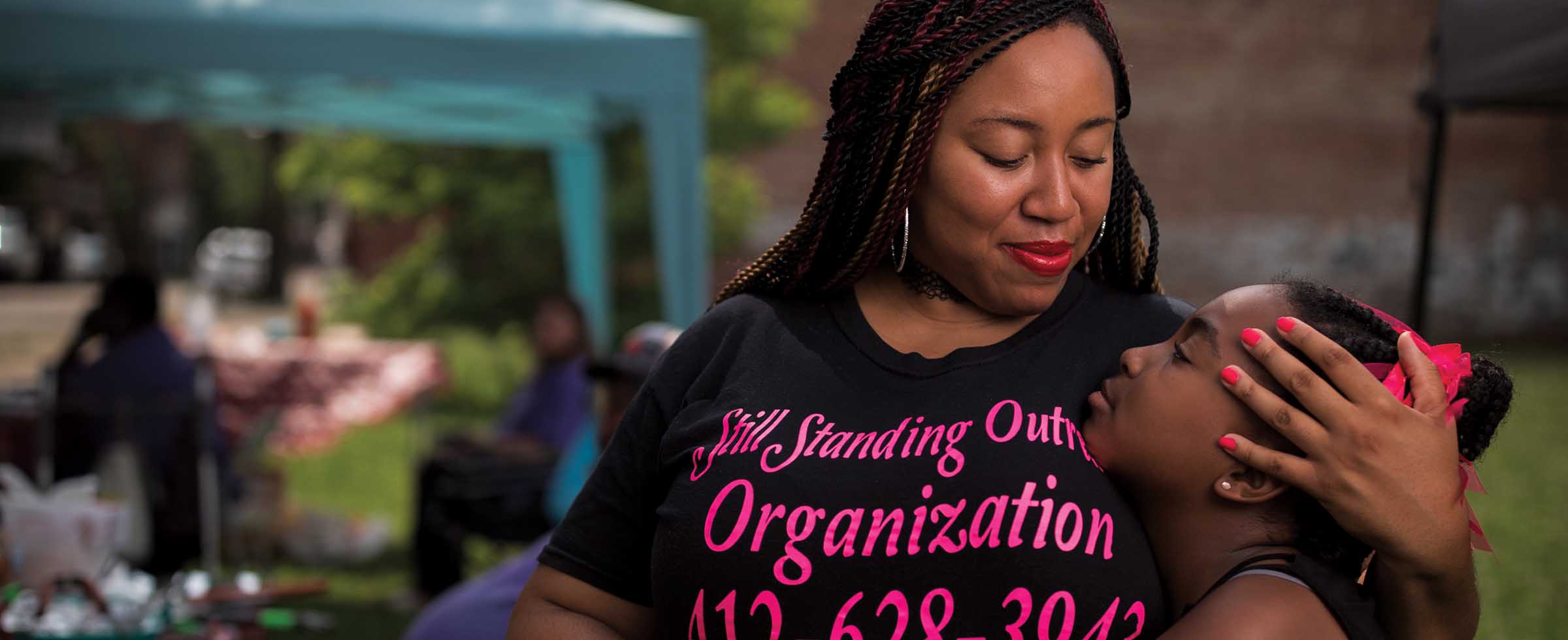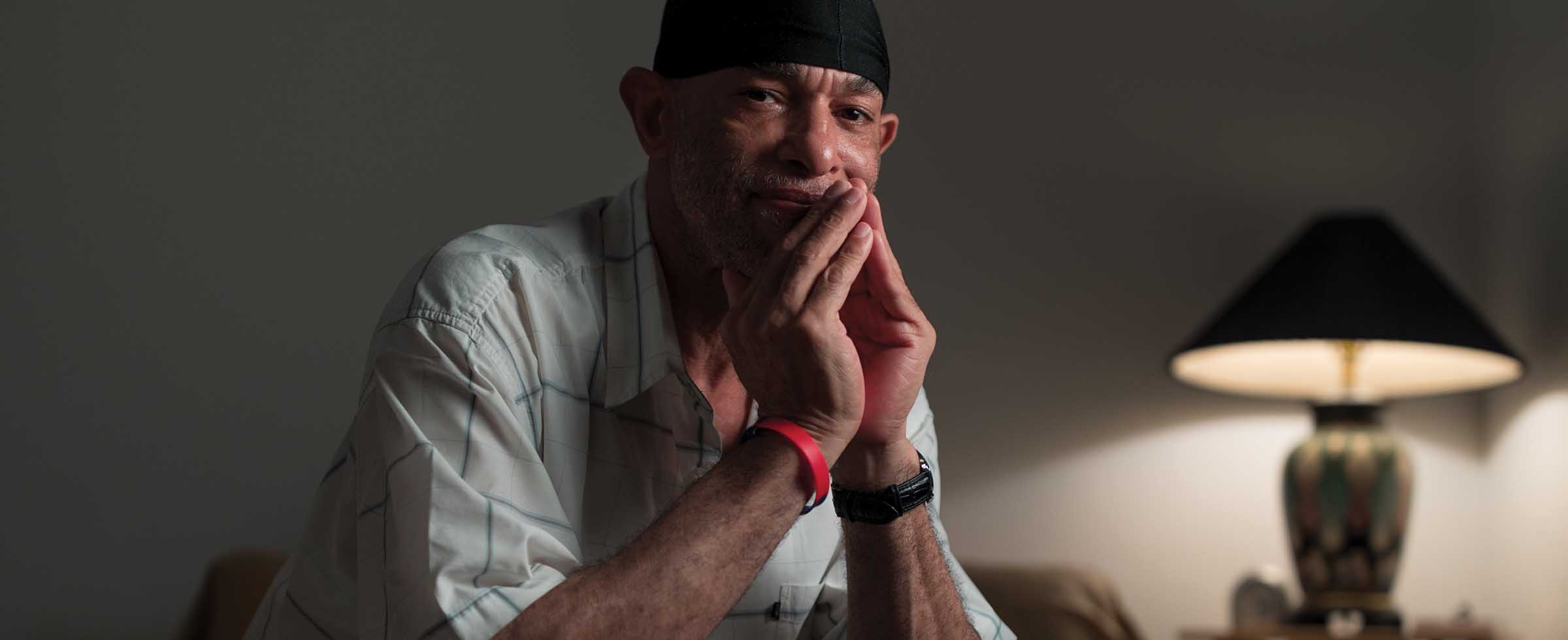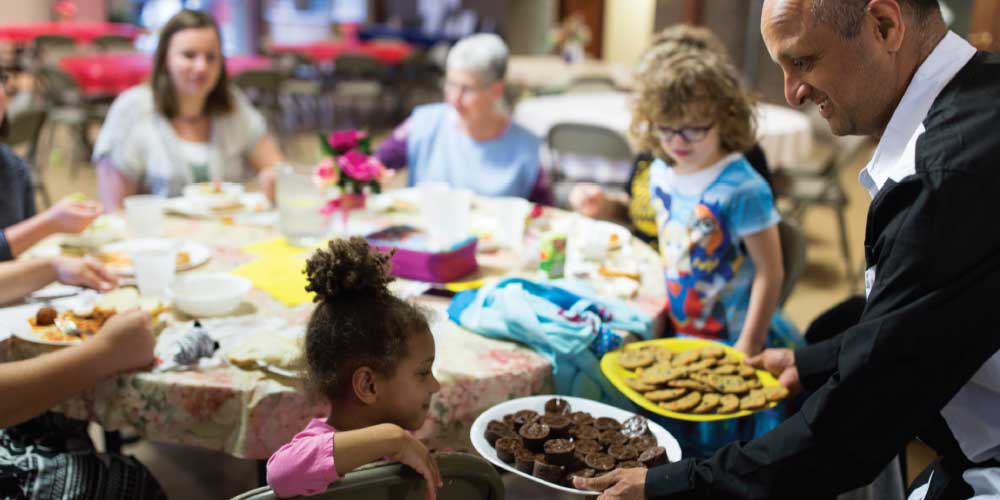Still standing100 Percent Pittsburgh

Elise M. McClung, pictured with her daughter, Anasjae, 10, at Grillin’ for a Cause, a fundraising cookout Elise organized for the Black and White Ball, which benefits families with emergency and ongoing needs.
ELISE M. McCLUNG IS MANY THINGS: a mother, college student, school bus driver, entrepreneur, volunteer and advocate. She’s also a survivor. Sent to a group home at 14 and emancipated from her mother at 16, she became a mother herself at 20, escaped an abusive relationship at 23 and lost her fiancé at 27. She lives in a comfortable home in Turtle Creek, about 12 miles southeast of Pittsburgh, where she’s working to finish her psychology degree and raise her 10-year-old daughter, Anasjae. In her limited spare time, she runs a travel company, plans events and volunteers for several nonprofits. She’s bursting with business ideas and ways to help others, and recently launched a self-styled outreach organization called “Still Standing” that offers several support services, including donated clothing delivery and transportation to Toys for Tots.
McClung is a single woman raising a child — a demographic category with about 30,000 members in Allegheny County. Families in this group are among the most likely to live in poverty, according to an Urban Institute report funded by The Pittsburgh Foundation. Seventy-seven percent of households experiencing poverty in Allegheny County are headed by single women. Elise and her daughter receive medical care and social services through Children’s Hospital of Pittsburgh Family Care Connection East in Turtle Creek and child care from the Allegheny Family Network. As part of its 100 Percent Pittsburgh initiative, The Pittsburgh Foundation is committed to listening to women like Elise, understanding their strengths, challenges and day-to-day experiences, and targeting support to nonprofits that help women and families meet their basic needs. Here is Elise’s story.
It was August 27, 2014 — a Wednesday — when I last saw my fiancé. His name was Nate, and we were supposed to pick up our marriage license that week.
Late that night, or maybe early the next morning, I remember sitting up in bed. When your soul is tied to someone else’s, you can feel that person, you know? And I sat there thinking, “I can’t feel him. Something is wrong.”
They found his body on Friday. The police told me on Saturday. He’d been discovered in the woods, shot one time in the back of the head.
Grief like that takes over your entire life. You have to relearn everything, even the easy stuff that you took for granted. Brushing my teeth became a chore. Cooking dinner seemed impossible. Suddenly I was a single parent again, with a murder investigation to deal with and a traumatized daughter with behavioral needs. She’d been close to Nate, too, and had basically lost a stepfather.
On top of it all, I found out I was pregnant. Nate and I had been trying for a baby. I have polycystic ovarian syndrome and had miscarried twice before. All the stress and grief of his death contributed to my third miscarriage. I said to God, “You’re kidding me. There’s no way this is happening.” We’d been about to get married and have a baby, and poof — everything was taken away.
My daughter kept me going. Anasjae is 10 years old now, and she’s made me a better, more thoughtful person. Having a child changes everything; it makes you do better because there’s someone looking up to you. (And believe me, they look at everything you do. They don’t miss a beat.)
So I had to fight through the grief. I had to do it for her. I had to get up when I just wanted to cry. Looking back, I had great support: My family and friends were awesome, and I don’t know what I would have done without Family Care Connections and the Allegheny Family Network. Between them, I could always call and talk to someone. They’d come and get me out of the house. They taught me how to advocate — I even gave a speech in Harrisburg about the importance of family support. They gave me resources and partners who were there for me. They connected me with parents who’d experienced what I was going through. They helped me build leadership skills and self-esteem, and I was never made to feel judged — they were simply there for me in my toughest, toughest times.
That’s what drives me today. How could I not take that love and support and give it back to others? I remember going to Toys for Tots last year and seeing parents with garbage bags waiting for the bus with their kids. That really bothered me, because here I am in December — I’m getting out of my warm car and getting my one little bag and getting back in the car and leaving. But they’re out there struggling. I thought, “I work for a school bus company, so I know I can get a discount. I can drive the bus, so that eliminates paying a driver.” And that’s how Transport Me to Toys came about. Last year, I drove a bus from Duquesne to Whitaker to Braddock to Rankin to Swissvale to the Strip. It was all free of charge; parents just had to be at the bus stop on time. I did it in honor of Nate. Hopefully I can get two buses this year, then three, then four…
I also run the Still Standing Mobile Clothing Store. I take donated clothes to people at rehabs, food banks, community centers, wherever. They can take whatever they want — there’s no limit. Again, it comes from a place of knowing what it means to struggle. I listen to people. I pray for them. I do what I can.
You know, people are single parents for lots of reasons. Some choose it, some have a death happen or a partner walk out. What I want to see is more awareness, more empathy toward parents and their children. I want teachers, school bus drivers and everybody else to understand that it’s a whole new era. We’re dealing with trauma. We’re dealing with mental illness. We’re at a time in this country when really, we just need to stop and help one another.
I’ve been through a lot but, thanks to God, I’m still standing. That’s what I want for my daughter. I want her to be able to move past what happened and grow up to be a whole, healthy adult. I want her to give back, to give people hope. I want her to tell those who are struggling, “Hey, it’s going to be okay. I’m here for you. I’m ready to help.
Original story appeared in the Report to the Community 2016-17





